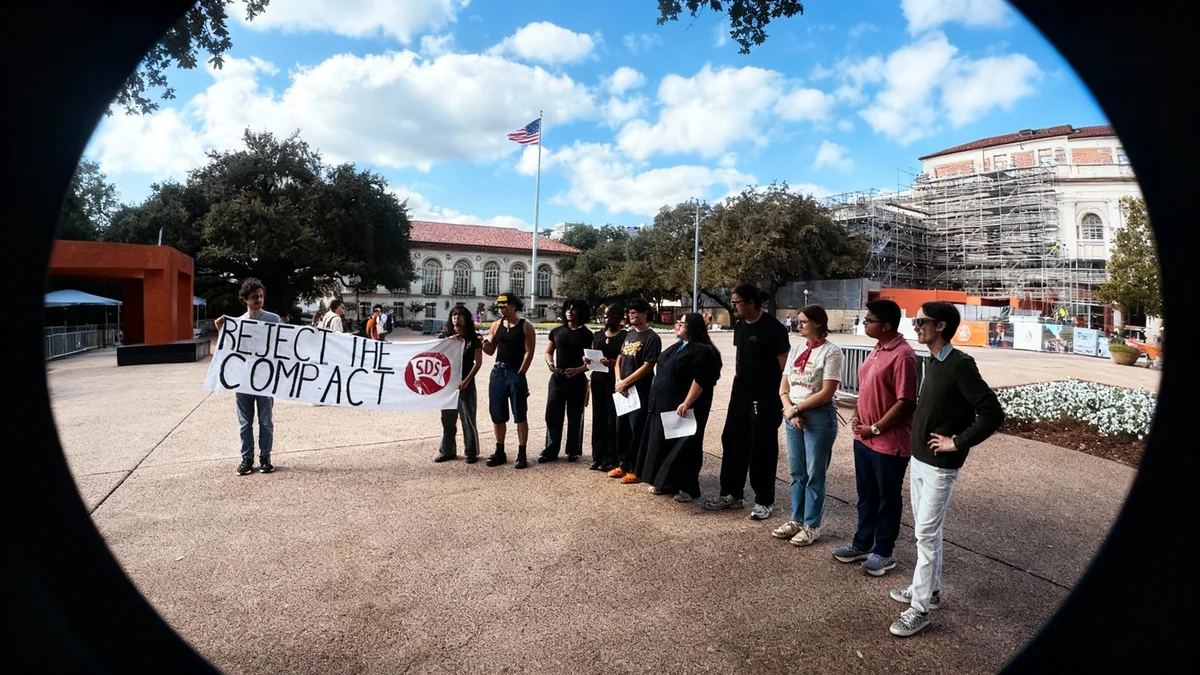The University of Texas at Austin administration is facing growing pressure from students as it remains silent on a proposed federal compact that could significantly alter campus policies. With a critical deadline from the Trump administration just days away, students are demanding transparency about the university's intentions regarding the deal, which offers preferential funding in exchange for major cultural and academic changes.
Concerns are particularly focused on the future of ethnic and gender studies programs, with many students fearing that their courses could be consolidated or eliminated as part of broader curriculum reviews.
Key Takeaways
- The University of Texas at Austin has not announced whether it will accept a federal compact offering funding for policy changes.
- Students are protesting the administration's silence, demanding a role in decisions that affect their education.
- Fears are growing over the potential consolidation of ethnic and gender studies courses.
- Recent Texas state laws, such as the ban on DEI initiatives, already align with some of the compact's requirements.
A Controversial Deal and a Looming Deadline
The proposal on the table is a significant one. UT Austin is one of nine universities offered a deal that would provide preferential federal funding. In return, the institution would be required to sign a compact committing to substantial changes in hiring practices, admissions processes, and enrollment policies for foreign students.
The agreement also calls for a reinforcement of policies that align with recent state-level legislative actions, creating a complex political landscape for the university administration. Despite the approaching deadline, officials have not publicly disclosed whether they are considering the compact or have made a decision.
This lack of communication has become a central point of contention on campus. Students report that their attempts to meet with administrators to discuss the university's plans have been unsuccessful, leading to feelings of exclusion from critical decisions about their own academic future.
Students Voice Fears Over Academic Future
On campus, the anxiety is palpable. Students gathered on Monday to express their concerns, arguing that the administration's silence is a deliberate strategy that leaves them in the dark.
“All we are looking for is transparency,” said Mikey Rush, a UT junior majoring in African Diaspora and Economics. “We have an obligation to be at the table when decisions are made that affect us all. This silence has been intentional.”
The potential impact on specific academic departments is a primary worry. Many fear that ethnic and gender studies programs are at risk of being consolidated or diminished. These concerns are not unfounded, as the UT system announced in September a review of all gender studies courses across its 14 institutions to ensure compliance with new state and federal guidelines.
State Laws Already Shaping Campus Policy
Much of what the proposed federal compact asks of universities is already being implemented at UT Austin due to recent Texas legislation. Senate Bill 17, passed in 2023, effectively banned Diversity, Equity, and Inclusion (DEI) offices and initiatives on public college campuses. Additionally, Senate Bill 37, which went into effect on September 1, mandates that public universities review their general education curricula.
For many students, the issue is deeply personal. Jacob Zaragoza, a freshman and the first in his family of 10 siblings to attend college, spoke about what is at stake for future generations.
“That’s why it’s so personal to me,” Zaragoza explained. “Because it’s not just about my ability to do this. It’s about my younger siblings. I want them to have this luxury as well.” His sentiment reflects a widespread fear that the changes could limit opportunities for minority and first-generation students.
University's Limited Response
While the administration has not directly addressed the Trump compact, it has taken steps to review its academic offerings. In October, UT Austin formed a new core curriculum task force to examine its general education requirements, citing the need to comply with state law and federal guidance.
During his recent inauguration, University President Jim Davis spoke about academic principles without mentioning the specific controversies. His remarks touched on the university's role and responsibilities.
In his inaugural address, President Jim Davis stated, “We recognize that as a public university, we hold a position of public trust. And we recommit to our long-held and enduring values, that we teach with intellectual honesty. We honor the traditions of both academic freedom and academic responsibility.”
However, for students feeling unheard, these broader statements offer little comfort. They argue that abstract commitments to academic freedom do not address their concrete fears about the future of their programs and the university's direction.
As the deadline for the federal compact decision approaches, the campus community remains on edge. Students continue to call for a clear answer from the university, hoping to gain a seat at the table before decisions are made that could reshape the educational landscape at one of the nation's largest public universities for years to come.





